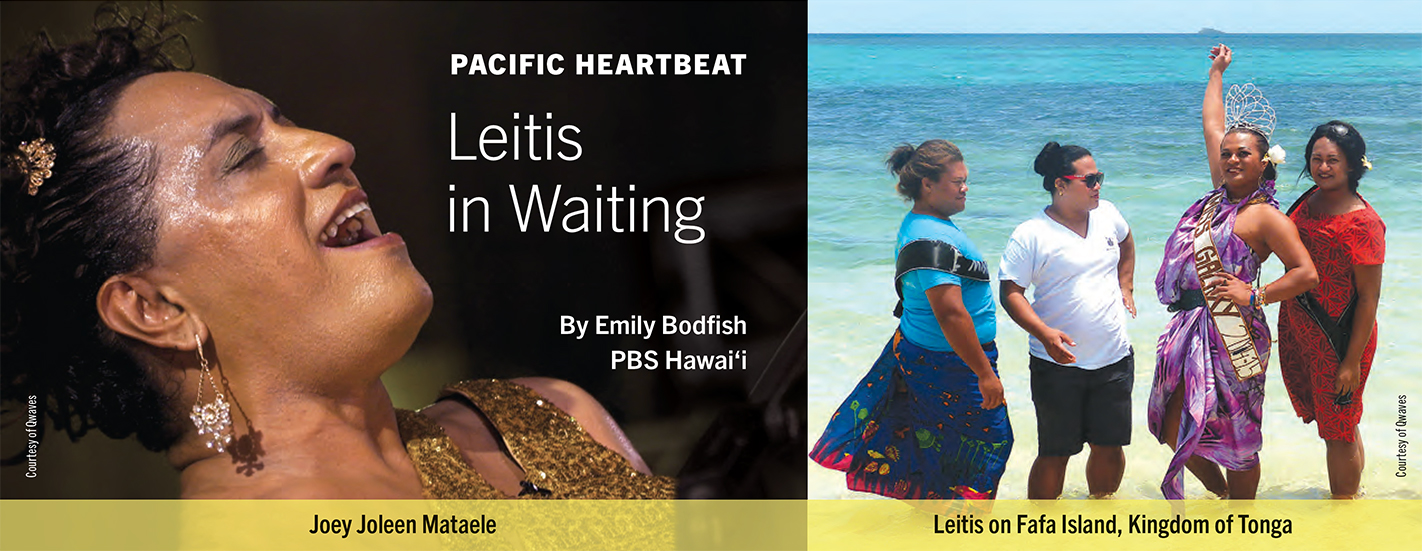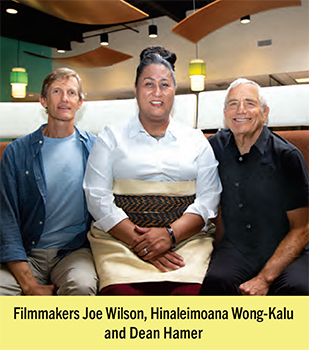The PBS Hawaiʻi Livestream is now available!
PBS Hawaiʻi Live TV
May 2019 program guide cover story by Emily Bodfish, PBS Hawai‘i
Now in its eighth season, the anthology series PACIFIC HEARTBEAT brings the authentic Pacific – people, cultures, languages, music and contemporary issues – to your screen. This new season brings stories of determination and courage from Australia, Rapa Nui (Easter Island), Tonga and the U.S. The series is a production of Pacific Islanders in Communications in partnership with PBS Hawaiʻi, and is distributed nationally by American Public Television.
Among the films premiering this month is Leitis in Waiting, which tells the story of the Kingdom of Tonga’s evolving approach to gender fluidity through character-driven portraits of leitis, or indigenous transgender women. The most prominent leiti, Joey Joleen Mataele, is a practicing Catholic of noble descent who, over the course of an eventful year, organizes a beauty pageant, and later a conference with fundamentalist Christians to discuss the rise of the rhetoric of intolerance toward leitis.
 Filmmakers Dean Hamer, Joe Wilson and Hinaleimoana Wong-Kale – the subject of Hamer and Wilson’s earlier film Kumu Hina, which was also a film about gender fluidity that aired nationally on PBS – spoke with us about the film:
Filmmakers Dean Hamer, Joe Wilson and Hinaleimoana Wong-Kale – the subject of Hamer and Wilson’s earlier film Kumu Hina, which was also a film about gender fluidity that aired nationally on PBS – spoke with us about the film:
Could you give us some insight into your intentions with the film, the meaning of it for you and your audience?
Hamer: At first, we thought we would create a short film about the [beauty] pageant itself, which Hina won one year, by the way. While pursuing that, we realized we needed to make a feature length film on the leitis search for equality and recognition in their own country.
Wilson: We wanted our film to have an effect everywhere, but especially in Tonga. Our approach to filmmaking is to show, not tell, and let the viewers decide for themselves. That approach lends itself to the Tongan talanoa method of conflict resolution. You sit down with your opposition and try to come to a mutual understanding. Joey, the protagonist of the film, is currently using the film in that way as part of her advocacy.
Hina, you were instrumental in making the film because of your insider knowledge of the culture. Could you give some insight into those cultural differences some viewers might not understand, including the concept of the “usefulness” of the leitis?
Wong-Kalu: In Tonga, the royal family is held in utmost regard. They are synonymous with the nation itself, the flag, and the national seal “God and Tonga are my inheritance.”
On “usefulness,” the understanding in Polynesian culture is that your worth is not measured by how much you acquire, but rather by how much you sacrifice of yourself. The Tongan understanding of the word “useful” as it applies to people is different from in the west. When you hear people in the film say that the leitis are “useful,” it is praise for their service to others.
Wilson: At the same time, the frustrations that we tried to capture on film is the leitis’ struggle with something that marginalized communities struggle with everywhere. Whenever leitis, or anyone that has been relegated to a certain place, says, “I deserve more,” a backlash occurs.
What do you think the U.S. and Tonga can learn from each other?
Wong-Kalu: I would like to beg the question – why does Tonga have to learn anything from the U.S.? Tongans had a great way of embracing everyone in society. I want Tonga to be more discerning about what they import.
Hamer: One thing the U.S. can learn is that gender diversity has been around for centuries, and widely accepted in many parts of the world. The vast majority hid because the forces against them were so strong, but they were still there. It isn’t going to kill society if those people don’t hide anymore.
Leitis in Waiting
Saturday, May 25 at 8:00 pm
Click here to see PACIFIC HEARTBEAT SEASON 8 programming lineup and schedule
